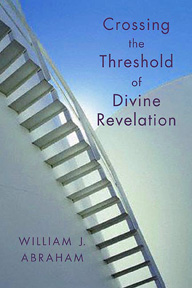Multimedia • Reference • Religion • Travel |
 Crossing the Threshold of Divine Revelation William J. Abraham
Description From The Publisher: The last few decades have seen a revolution in debates about the rationality of Christian belief. Among the array of current options for justifying religious belief, however, nearly every one assumes that a general theory of knowing and a minimal version of theism must be adopted before the rationality of Christian belief can be tackled. In Crossing the Threshold of Divine Revelation William J. Abraham confronts both of these assumptions, arguing that epistemology must begin with its particular target of inquiry — in Abraham’s case the full-blooded “canonical theism” of the early, undivided Christian church. He argues, moreover, that special divine revelation forms a crucial threshold at the entrance to the epistemology of Christian belief. Sure to intrigue philosophers, theologians, and curious students, Abraham’s robust vision of Christian faith provides a creative solution to many of the current difficulties in philosophy and theology. Reviews Reader's Index Send us your favorite quotes or passages from this book. About the Author William J. Abraham is Albert Cook Outler Professor of Theology and Wesley Studies at Perkins School of Theology, Southern Methodist University. His other books include Canon and Criterion in Christian Theology: From the Fathers to Feminism (Oxford). Table of Contents
Acknowledgments Preface Index Customer Reviews Write your own online review. Look for Similar Books by Subject | |||||||
Copyright ©1996-2011 CenturyOne Bookstore. All Rights Reserved. All prices subject to change and given in U.S. dollars. Your purchase from CenturyOne.com will assist the CenturyOne Foundation in providing funding for various archaeological and research projects which seek to provide more information about the period of the First Century C.E., the origins of Christianity and the world of the Bible in general. All materials contained in http://www.centuryone.com are protected by copyright and trademark laws and may not be used for any purpose whatsoever other than private, non-commercial viewing purposes. Derivative works and other unauthorized copying or use of stills, video footage, text or graphics is expressly prohibited. |

